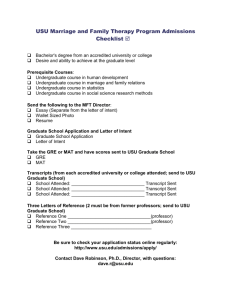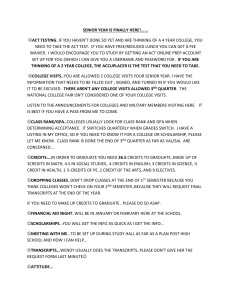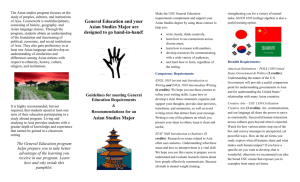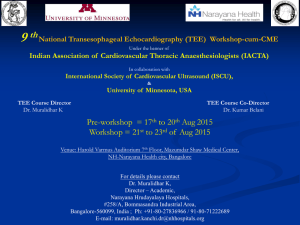Graduate Programs - School of Applied Sciences, Technology and
advertisement
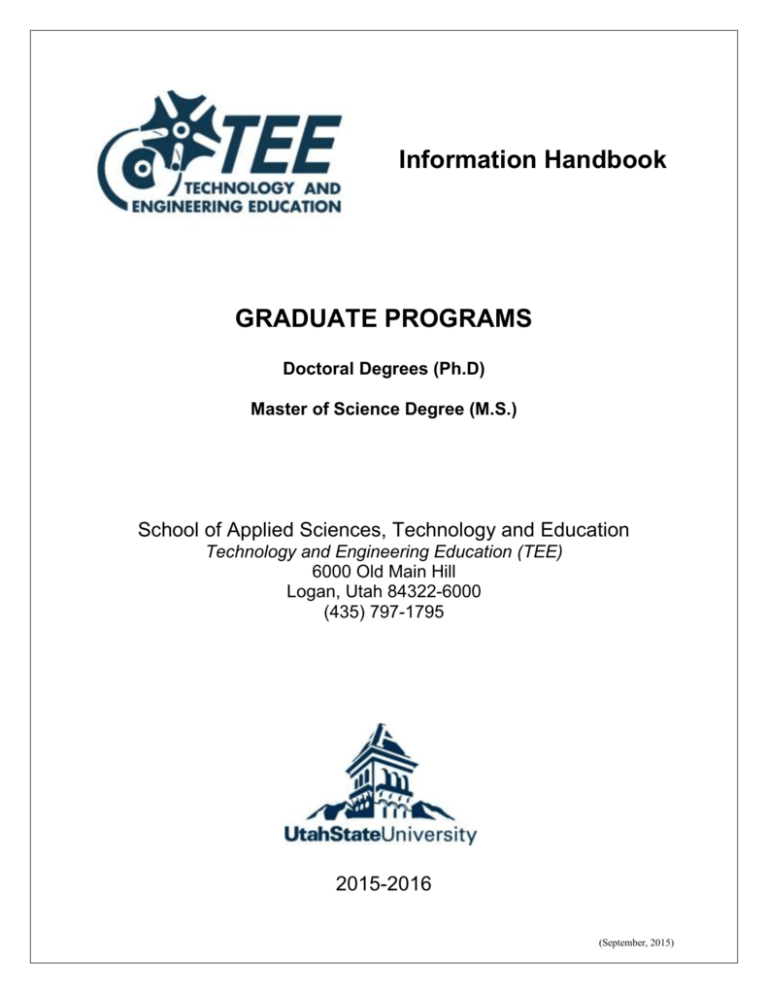
Information Handbook GRADUATE PROGRAMS Doctoral Degrees (Ph.D) Master of Science Degree (M.S.) School of Applied Sciences, Technology and Education Technology and Engineering Education (TEE) 6000 Old Main Hill Logan, Utah 84322-6000 (435) 797-1795 2015-2016 (September, 2015) Welcome This information package is provided to help you apply for and gain admission into the graduate programs offering content in Technology and Engineering Education (TEE) at Utah State University (USU). TEE is administratively housed in the School of Applied Sciences, Technology, and Education (ASTE - http://aste.usu.edu). Founded in 1888, Utah State University is a public research university located in Logan, Utah. It is a land-grant and space-grant institution comprised of more than 28,000 students and is the largest public residential campus in Utah. To learn more about USU, please visit its website at www.usu.edu. Graduate Programs The TEE program offers students the opportunity to obtain a master’s degree in Technology and Engineering Education or a doctoral degree in Education. Engineering Education. Doctor of Philosophy (Ph.D) Degree The School of Teacher Education and Leadership (TEAL) in the Emma Eccles Jones College of Education and Human Services administers an interdepartmental program leading to a doctoral degree (PhD) in Education specializing in Curriculum and Instruction (C&I). In this interdepartmental program, a “concentration area” in Technology and Engineering Education is available (see: https://teal.usu.edu/htm/graduateprograms/curriculum-and-instruction-doctoral-programs/concentrationareas). Students who complete the C&I specialization program receive a degree with a concentration area in technology and engineering education. This is a research degree and is primarily chosen by people who are seeking teaching/research positions in colleges and universities. Applicants interested in the doctoral degree program must apply through USU’s School of Teacher Education and Leadership. Information about applying for this degree can be found at: http://teal.usu.edu/htm/graduate-programs/curriculum-and-instructiondoctoral-programs Information about the Technology and Engineering Education emphasis area can be found at: http://teal.usu.edu/files/uploads/Doctoral/TEE%20Doctoral%20Program%20Courses.p df 2 Master of Science (M.S.) Degree The Master of Science (M.S.) degree program is primarily designed for professionals in the areas of Technology and Engineering Education (TEE), and Career and Technical Education (CTE) who want to improve their knowledge and skills in such areas as curriculum development, research methods, current educational theory, and evaluation and assessment. In this program, students are required to complete a “professional core” of courses (12 credits) that are used to enhance their knowledge of current theory and practice in TEE, and CTE, and complete the specific requirements of either the Plan A or Plan B option (see below). In consultation with their advisor and/or graduate committee, students will select electives that help them achieve their educational objectives and fulfill the requirements of the graduate program. Current USU undergraduates may take Master Degree courses provided they meet USU requirements and they must complete a USU Split Form prior to enrolling in classes (see: http://research.usu.edu/graduateschool/files/uploads/SplitForm.pdf). The Spit Form gives permission for students to register for graduate courses. To use the Split Form, students must be within 30 semester credits of completing bachelor's requirements, have filed an Application for Graduation in the Graduation Office, have a 3.0 or higher GPA, and have applied for admission to the School of Graduate Studies. Options Plan A (30 credits required): The Plan A “thesis” option requires students to complete a master thesis. This plan is especially beneficial to students preparing for advanced study (e.g., a doctoral degree). In this option, students are required to complete a statistics course and a minimum of three credits of Thesis Research (TEE 6970). Plan B (33 credits required): The Plan B “project” option requires students to complete an in-depth “scholarly project” (e.g., a major program or curriculum revision or pilottesting a new instructional strategy or teaching method.) In this option, students are required to complete the experimental lab course (TEE 6910) and the Master’s Project Course (TEE 6960). TEE Master’s Program Requirements and Check Sheet The degree requirements and check sheet for the TEE Master’s Program can be found at the following site: http://www.aste.usu.edu/htm/graduate/grad-technology-andengineering-education. 3 Master Degree Program Options Full Time Program: A full-time Master's degree program is available on the main campus of USU during the regular school year. This program is recommended for students completing the Plan A option. One-Month Summer: A four-week summer school graduate program is offered on the main campus of USU. The summer program permits graduate students to take a full load of courses in the summer during a short period of time. Summer Housing: Visit USU Housing & Residence Life (http://www.usu.edu/housing) to learn about housing options at USU during the summer. Admission Information Information for applying to USU graduate programs can be found at http://rgs.usu.edu/graduateschool/admissions. At this site, you can find out information related to such items as how to apply, admissions deadlines, admissions requirements, tuition and costs, funding options, financial aid, and residency requirements. Important information about being a graduate student at USU can be found in USU’s General Catalog (see: http://catalog.usu.edu/preview_entity.php?catoid=12&ent_oid=998&hl=Grad+School&r eturnto=search). You are encourage to review this section as it provides detailed helpful information you will need as you complete your graduate degree. TEE Graduate Program Admission Requirements Admission to the TEE program follows the general USU requirements. In order to be admitted to a graduate degree program at Utah State University, you must meet these minimum requirements: Have the requisite degree for your intended program by the time you are matriculated 3.0 or higher GPA on your last 60 semester or 90 quarter credits Score at or above the 40th percentile on appropriate admissions test. NOTE: The GRE is required for admittance into the doctoral degree program. For admittance into the master degree program, either the GRE or MA can be used for admittance. Three satisfactory letters of recommendation Important Notes: A 3.0 GPA is required for all graduate degrees. Students have up to 6 years to complete a master's degree and up to 8 years to complete a doctorate. 4 For a master's degree, the minimum number of credits required ranges from 3036; 24 of those credits must be from USU. For a PhD, 60 semester credits is the minimum with a master's degree in a related field; 90 credits are required without a Master’s Degree. Doctoral students must meet an academic residency requirement. Up to 12 semester graduate-level credits may be transferred to a USU graduate degree from an accredited university if approved by the student's supervisory. These transfer credits should have grades of B or higher, should not exceed the 8 year limit from degree completion, and should not have been used for another degree. A maximum of 12 semester graduate credit hours may be earned before matriculation. Matriculation occurs when you have completed all the admission requirements and have been officially accepted into USU’s graduate school and the TEE program. Credits taken beyond 12 semester credits cannot be used to fulfill degree requirements. Graduate Student Responsibilities After you have been matriculated, you will be assigned a temporary advisor who will assist you in completing the requirements of the program. However, it is your responsibility to make sure that all required degree forms (e.g., a Supervisory Committee Assignment and Program of Study) are completed in a timely manner following graduate school recommendations. Graduate school degree form and helpful checklists for degree completion can be found at: http://rgs.usu.edu/graduateschool. Financial Assistance A limited number of graduate teaching and research assistantships, as well as nonresident tuition scholarships are available to full-time graduate students. Please contact Dr. Bruce Miller, Assistant Dean and Department Head, School of Applied Sciences, Technology and Education, (435) 797-2232, bruce.miller@usu.edu, to find out about the current types of financial assistantships available. Graduate Courses for Master’s Degree In addition to completing the required professional core courses, students are encouraged to take “elective courses” in other areas that will help them to meet their own professional and career goals. For example, supporting courses outside the TEE program can be taken from other disciplines, such as Agricultural Extension and Education (see: http://aste.usu.edu/htm/graduate/aee), Instructional Technology and Learning Sciences (see: http://itls.usu.edu), Engineering Education (see http://www.eed.usu.edu), and the “on-line only” Career and Technical Education (CTE) Masters of Education (see: http://aste.usu.edu/htm/graduate/cte). 5 TEE Graduate Course Offerings Required Professional Core (12 credits) TEE 6090/ASTE 6090 Program Design (3 credits) TEE 6100 Contemporary Issues (3 credits) TEE 6150/ASTE 6150 Evaluation and Assessment (3 credits) TEE 6450 Administration and Organization (3 credits) Plan A (6 credits) TEE 6970 EDUC/PSY 6570 or EDUC/PSY 6570 Plan B (9 credits) TEE 6910 TEE 6960 ASTE 6140 Thesis Research (3 credits) Design & Analysis I (3 credits) Introduction to Education and Psychological Research (3 credits) Experimental Laboratory (3 credits) Master’s Project (3 credits) Reading and Applying Research (3 credits) TEE Summer Courses (on campus) Note: The TEE Summer Program is currently under revision and will be posted sometime during Fall Semester 2015. Graduate Coordinator For further information about TEE’s graduate programs, please contact: Edward M. Reeve, PhD Professor Utah State University Technology and Engineering Education (TEE) 6000 Old Main Hill Logan, Utah 84322-6000 Ph: (435) 797-3642 Fax: (435) 797-2567 E-Mail: ed.reeve@usu.edu 6
